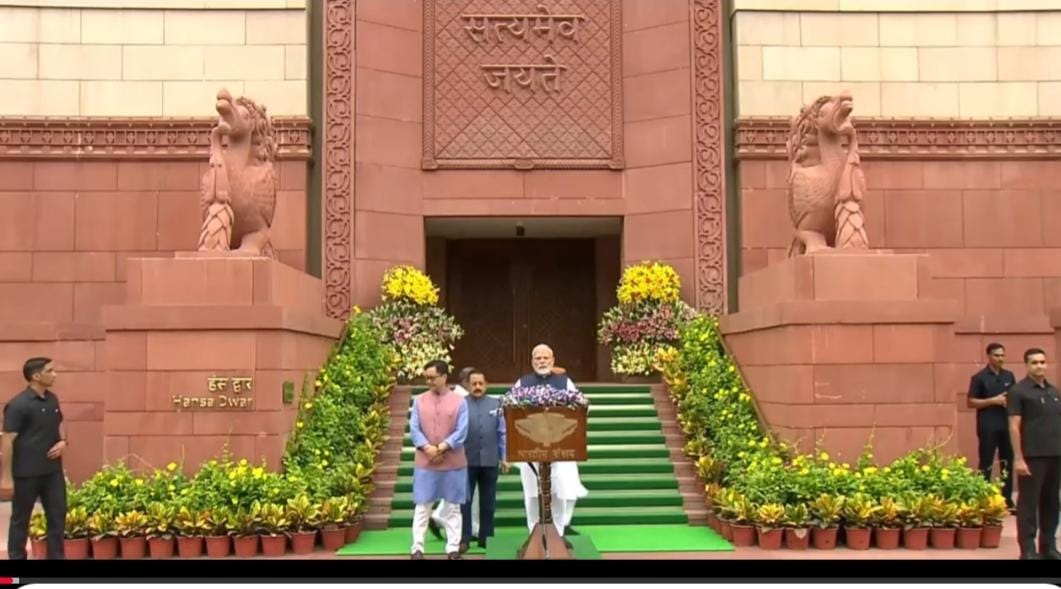NEW DELHI: As the Monsoon Session of Parliament opened on Monday, Prime Minister Narendra Modi’s insignificant foreign tour triggered sharp criticism from the opposition parties. With Parliament expected to take up urgent national concerns—ranging from electoral roll revisions and rising unemployment to the fallout of Operation Sindoor and tensions in Manipur—Modi’s tour for the Maldives and Britain in two days on Wednesday has been labelled “irresponsible” and “undemocratic.”
He came to the Parliament House just for a customary address to the media and token presence in Lok Sabha before start of the session and then left, without attending any preceding of either of the two Houses. He may have watched from his Parliament office the chaos by the Opposition in the Lok Sabha.
Leader of opposition in Lok sabha Rahul Gandhi accused the Prime Minister of “running away from accountability” and added that “dodging Parliament during a national crisis reflects contempt for democratic responsibility.” Leaders of the TMC, CPI(M), and DMK echoed this view, claiming the Prime Minister is prioritizing optics abroad over urgent domestic obligations.
The Government sources defended the foreign trip, calling it “pre-scheduled and strategically important.” However, observers note that the timing of Modi’s visit—covering the United Kingdom and Maldives—raises serious questions about its strategic value.
India-Maldives relations are at a historic low. President Mohamed Muizzu’s government has asked Indian military personnel to leave the country and has moved significantly closer to China. Beijing’s influence in the Indian Ocean, part of its broader “String of Pearls” strategy, is growing. India’s once-dominant position in the Maldives has diminished, and there is little indication that this visit will reverse that trend. Critics argue that the trip may yield symbolic gestures but lacks the leverage needed to effect substantive policy change.
The UK leg of the visit also appears mistimed. Post-Brexit Britain remains economically sluggish, facing inflation, political instability, and subdued global engagement. The long-pending India-UK Free Trade Agreement shows no sign of resolution, and the recent general elections have brought in a government that may further stall negotiations. Analysts suggest that, in its current state, the UK cannot offer India immediate or meaningful economic returns. As such, the visit risks being more ceremonial than productive.
Back home, this is the first parliamentary session following two major national security incidents—Operation Sindoor and the Pahalgam terror attack. In addition, rising concerns about Chinese military activities near the Arunachal border have put national security back in the spotlight. Opposition parties have demanded that the Prime Minister address Parliament directly on these issues. His absence is seen as evasion, undermining the constitutional role of Parliament as the primary forum for accountability.
Critics say this decision reflects a widening gap between India’s foreign diplomacy and its domestic democratic obligations. While international engagement is vital, the Prime Minister’s physical presence during key parliamentary sessions is central to a healthy democracy. Skipping Parliament during times of crisis reinforces the opposition’s long-standing charge of unilateralism within the executive.
Following Operation Sindoor, India failed to secure visible international endorsement for its security actions. The silence from key global players has raised serious concerns about India’s current diplomatic strategy. This makes Modi’s absence from Parliament even more troubling. Rather than providing clarity and direction in the national legislature, he has chosen to be abroad—on what some critics are calling a “tourism-oriented” visit funded by public money.
Conclusion
Given the current geopolitical climate, the strategic returns from Modi’s foreign tour are questionable. The Maldives has tilted firmly toward China, and the UK lacks the political bandwidth to deliver meaningful outcomes. Meanwhile, the Indian Parliament is convening to deliberate on issues of critical national interest. In this context, the Prime Minister’s decision to be overseas appears to prioritise diplomatic spectacle over democratic responsibility. The criticism, both within Parliament and beyond, is not only justified—it is intensifying.






